
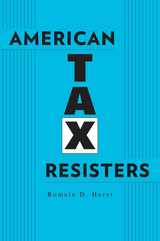
“The American taxpayer”—angered by government waste and satisfied only with spending cuts—has preoccupied elected officials and political commentators since the Reagan Revolution. But resistance to progressive taxation has older, deeper roots. American Tax Resisters presents the full history of the American anti-tax movement that has defended the pursuit of limited taxes on wealth and battled efforts to secure social justice through income redistribution for the past 150 years.
From the Tea Party to the Koch brothers, the major players in today’s anti-tax crusade emerge in Romain Huret’s account as the heirs of a formidable—and far from ephemeral—political movement. Diverse coalitions of Americans have rallied around the flag of tax opposition since the Civil War, their grievances fueled by a determination to defend private life against government intrusion and a steadfast belief in the economic benefits and just rewards of untaxed income. Local tax resisters were actively mobilized by business and corporate interests throughout the early twentieth century, undeterred by such setbacks as the Sixteenth Amendment establishing a federal income tax. Zealously petitioning Congress and chipping at the edges of progressive tax policies, they bequeathed hard-won experience to younger generations of conservatives in their pursuit of laissez-faire capitalism.
Capturing the decisive moments in U.S. history when tax resisters convinced a majority of Americans to join their crusade, Romain Huret explains how a once marginal ideology became mainstream, elevating economic success and individual entrepreneurialism over social sacrifice and solidarity.
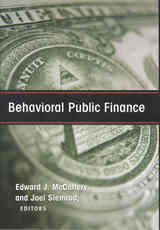

Beyond Debt describes efforts to create a transnational economy free of debt. Based on ethnographic fieldwork in Malaysia, Daromir Rudnyckyj illustrates how the state, led by the central bank, seeks to make the country’s capital Kuala Lumpur “the New York of the Muslim world”—the central node of global financial activity conducted in accordance with Islam. Rudnyckyj shows how Islamic financial experts have undertaken ambitious experiments to create more stable economies and stronger social solidarities by facilitating risk- and profit-sharing, enhanced entrepreneurial skills, and more collaborative economic action. Building on scholarship that reveals the impact of financial devices on human activity, he illustrates how Islamic finance is deployed to fashion subjects who are at once more pious Muslims and more ambitious entrepreneurs. In so doing, Rudnyckyj shows how experts seek to create a new “geoeconomics”—a global Islamic alternative to the conventional financial network centered on New York, London, and Tokyo. A groundbreaking analysis of a timely subject, Beyond Debt tells the captivating story of efforts to re-center international finance in an emergent Islamic global city and, ultimately, to challenge the very foundations of conventional finance.
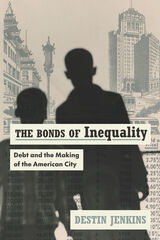
In this passionate and deeply researched book, Destin Jenkins shows in vivid detail how, beyond the borrowing decisions of American cities and beneath their quotidian infrastructure, there lurks a world of politics and finance that is rarely seen, let alone understood. Focusing on San Francisco, The Bonds of Inequality offers a singular view of the postwar city, one where the dynamics that drove its creation encompassed not only local politicians but also banks, credit rating firms, insurance companies, and the national municipal bond market. Moving between the local and the national, The Bonds of Inequality uncovers how racial inequalities in San Francisco were intrinsically tied to municipal finance arrangements and how these arrangements were central in determining the distribution of resources in the city. By homing in on financing and its imperatives, Jenkins boldly rewrites the history of modern American cities, revealing the hidden strings that bind debt and power, race and inequity, democracy and capitalism.

This book examines two eras of Chinese history that have commonly been viewed as periods of state disintegration or retreat. And they were—at the central level. When re-examined at the local level, however, both are revealed as periods of state building. In both the Nanjing decade of Guomindang rule (1927-1937) and the early post-Mao reform era (1980-1992), both national and local factors shaped local state building and created variations in local state structures and practices. This book focuses on one key area of the state, taxation and public finance, to trace the processes of local state building in these two eras. Using the records of local tax and finance offices in the Tianjin area and in Guangdong province, the author maps the process by which these county-level offices grew.
This book highlights variation in local state structures and practices between localities and between the central and local governments. As the author shows, this variation is important because it results in regional differences in state-society relations and affects central state capacity in terms of the local state's ability to implement central state policies as well as its own.
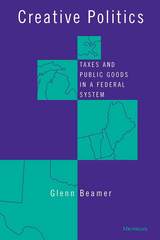
Beamer identifies six factors that influence legislators' decisions: accountability, dependability, equity, obscurability, and horizontal and vertical transferability. Within the context created by citizen demands, intergovernmental politics, policy histories, court interventions, and state constitutions, this study analyzes how legislators employ these principles to develop and enact policies.
In addition to modeling state politics within the context of federalism, Creative Politics, reflecting the author's extensive interviews with legislators, is novel in its focus on politicians' views about public services, the strategies to finance them, and efforts to develop and maintain political support for them.
This book will be of interest to students and scholars of political science, economics, and public administration, and, more specifically, of federalism, state politics and policy, and legislative decision-making.
Glenn Beamer is Robert Wood Johnson Scholar in Health Policy Research, University of California, Berkeley, and Assistant Professor of Government, University of Virginia.
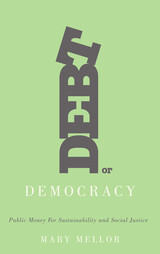
A direct challenge to conventional economic thinking, Debt or Democracy offers a bracing new analysis of our economic crisis and offers cogent, radical alternatives to create a more just and sustainable economic future.

As the federal government has cut back its support for domestic services, state governments increasingly have been forced to assume a leadership position. In this book, prominent experts describe and analyze how state governments in the 1990s have coped with fiscal stress through changes in tax and spending policies, as well as through attempts to "reinvent government" by abandoning long-established policies.
In an era when state budgets verge on the brink of deficit, state governments face the difficult task of reconciling the public's wish for low taxes with its desire for increased services—better schools, improved health systems, more prisons. This volume provides both a comparative overview of the fifty states as they try to meet conflicting needs and incisive case studies of six states with a reputation for being national leaders—California, Connecticut, Florida, Massachusetts, Michigan, and Minnesota. It explores how much substance there is to claims that states were successful in developing innovative policies.
The Fiscal Crisis of the States draws upon research to analyze what is really happening in the state capitols. Boiling down the diverse experiences of various states into a number of important lessons, this book will be a valuable resource for academics, policymakers, and public administrators, as well as the general reader, to understand the reality of state fiscal policies.

In his application of statistical methods to history, Mr. Molho offers a new approach to the study of Florentine politics.
Scholars have long recognized that Florence’s deficit-financing of its wars of independence against the Visconti of Milan had far-reaching economic, political, and social effects, but this is the first document-based history to provide concrete support for that general knowledge.
Focusing on the governmental and fiscal agencies of Florence as well as a number of memoirs and account hooks written by Florentine citizens, Mr. Molho has gathered and statistically reconstructed much archival material on Florentine taxation, public income, and expenses.
He concludes that between 1423 and 1433 Florence underwent a prolonged and vast fiscal crisis that affected both the fiscal structure of the city and its constitutional and institutional framework. His work thus sheds new light on Cosimo de’ Medici’s rise to power in 1434.
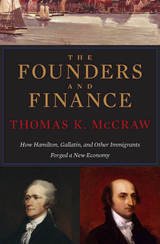
In 1776 the United States government started out on a shoestring and quickly went bankrupt fighting its War of Independence against Britain. At the war’s end, the national government owed tremendous sums to foreign creditors and its own citizens. But lacking the power to tax, it had no means to repay them. The Founders and Finance is the first book to tell the story of how foreign-born financial specialists—immigrants—solved the fiscal crisis and set the United States on a path to long-term economic success.
Pulitzer Prize–winning author Thomas K. McCraw analyzes the skills and worldliness of Alexander Hamilton (from the Danish Virgin Islands), Albert Gallatin (from the Republic of Geneva), and other immigrant founders who guided the nation to prosperity. Their expertise with liquid capital far exceeded that of native-born plantation owners Washington, Jefferson, and Madison, who well understood the management of land and slaves but had only a vague knowledge of financial instruments—currencies, stocks, and bonds. The very rootlessness of America’s immigrant leaders gave them a better understanding of money, credit, and banks, and the way each could be made to serve the public good.
The remarkable financial innovations designed by Hamilton, Gallatin, and other immigrants enabled the United States to control its debts, to pay for the Louisiana Purchase of 1803, and—barely—to fight the War of 1812, which preserved the nation’s hard-won independence from Britain.
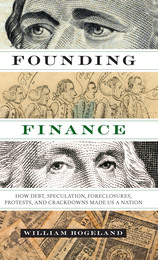
Recent movements such as the Tea Party and anti-tax “constitutional conservatism” lay claim to the finance and taxation ideas of America’s founders, but how much do we really know about the dramatic clashes over finance and economics that marked the founding of America? Dissenting from both right-wing claims and certain liberal preconceptions, Founding Finance brings to life the violent conflicts over economics, class, and finance that played directly, and in many ways ironically, into the hardball politics of forming the nation and ratifying the Constitution—conflicts that still continue to affect our politics, legislation, and debate today.
Mixing lively narrative with fresh views of America’s founders, William Hogeland offers a new perspective on America’s economic infancy: foreclosure crises that make our current one look mild; investment bubbles in land and securities that drove rich men to high-risk borrowing and mad displays of ostentation before dropping them into debtors’ prisons; depressions longer and deeper than the great one of the twentieth century; crony mercantilism, war profiteering, and government corruption that undermine any nostalgia for a virtuous early republic; and predatory lending of scarce cash at exorbitant, unregulated rates, which forced people into bankruptcy, landlessness, and working in the factories and on the commercial farms of their creditors. This story exposes and corrects a perpetual historical denial—by movements across the political spectrum—of America’s all-important founding economic clashes, a denial that weakens and cheapens public discourse on American finance just when we need it most.

From his birth in the lowest stratum of the samurai class to his assassination at the hands of right-wing militarists, Takahashi Korekiyo (1854-1936) lived through tumultuous times that shaped the course of modern Japanese history. Takahashi is considered "Japan's Keynes" in many circles because of the forward-thinking (and controversial) fiscal and monetary policies--including deficit financing, currency devaluation, and lower interest rates--that he implemented to help Japan rebound from the Great Depression and move toward a modern economy.
Richard J. Smethurst's engaging biography underscores the profound influence of the seven-time finance minister on the political and economic development of Japan by casting new light on Takahashi's unusual background, unique talents, and singular experiences as a charismatic and cosmopolitan financial statesman.
Along with the many fascinating personal episodes--such as working as a houseboy in California and running a silver mine in the Andes--that molded Takahashi and his thinking, the book also highlights four major aspects of Takahashi's life: his unorthodox self-education, his two decades of service at the highest levels of government, his pathbreaking economic and political policies before and during the Depression, and his efforts to stem the rising tide of militarism in the 1930s. Deftly weaving together archival sources, personal correspondence, and historical analysis, Smethurst's study paints an intimate portrait of a key figure in the history of modern Japan.
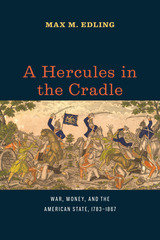
Two and a half centuries after the American Revolution the United States stands as one of the greatest powers on earth and the undoubted leader of the western hemisphere. This stupendous evolution was far from a foregone conclusion at independence. The conquest of the North American continent required violence, suffering, and bloodshed. It also required the creation of a national government strong enough to go to war against, and acquire territory from, its North American rivals.
In A Hercules in the Cradle, Max M. Edling argues that the federal government’s abilities to tax and borrow money, developed in the early years of the republic, were critical to the young nation’s ability to wage war and expand its territory. He traces the growth of this capacity from the time of the founding to the aftermath of the Civil War, including the funding of the War of 1812 and the Mexican War. Edling maintains that the Founding Fathers clearly understood the connection between public finance and power: a well-managed public debt was a key part of every modern state. Creating a debt would always be a delicate and contentious matter in the American context, however, and statesmen of all persuasions tried to pay down the national debt in times of peace.

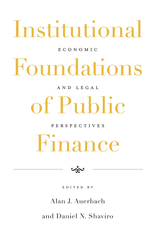
Institutional Foundations of Public Finance integrates economic and legal perspectives on taxation and fiscal policy, offering a provocative assessment of the most important issues in public finance today.
Part I, an in-depth look at the tax reform debate, examines the differences between an income and a consumption tax and poses significant questions about the systematic transition from one to the other, as well as about its implementation. Part II takes a focused look at a broad range of fiscal topics, including fiscal federalism, corporate finance, and fiscal language. As a whole, the volume reflects a keen interest in analyzing real-world problems, including fiscal regimes and institutions, that have major policy implications.
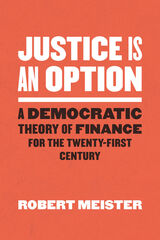
Justice Is an Option uses those problems—and the framework of finance that created them—to reimagine historical justice. Robert Meister returns to the spirit of Marx to diagnose our current age of finance. Instead of closing our eyes to the political and economic realities of our era, we need to grapple with them head-on. Meister does just that, asking whether the very tools of finance that have created our vastly unequal world could instead be made to serve justice and equality. Meister here formulates nothing less than a democratic financial theory for the twenty-first century—one that is equally conversant in political philosophy, Marxism, and contemporary politics. Justice Is an Option is a radical, invigorating first page of a new—and sorely needed—leftist playbook.

Combining powerful insights from theory with close observation of data, Robert Barro’s new book goes a long way toward the establishment of an empirically based macroeconomic theory.
Barro first presents a positive theory of government economic policymaking by using applied game theory to model strategic interactions between policymakers and the private sector. He applies this framework to questions of rules, discretion, and reputation in monetary policy. He then takes a close look at whether monetary disturbances have a strong effect on business fluctuations, concluding that the effect is neither as strong nor as pervasive as many economists have believed. He consequently turns his attention from monetary policy to fiscal policy. The originator of the modern theory of Ricardian equivalence, which says that taxes and budget deficits are logically equivalent, Barro summarizes the current debate and argues that the Ricardian theorem is the correct starting point for the analysis of intertemporal government finance. Finally, stating his belief that macroeconomists have probably spent too much time thinking about deficits—which relate to how government spending is financed—and not enough about the effects of government expenditures themselves, he examines evidence of the macroeconomic effects of government spending in the United States and Great Britain.
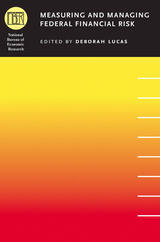
This book contains new research, both empirical and methodological, on the measurement and management of these costs and risks. The analyses encompass a broad spectrum of federal programs, including housing, catastrophe insurance, student loans, social security, and environmental liabilities. Collectively, the contributions gathered in Measuring and Managing Federal Financial Risk demonstrate that the logic of financial economics can be a useful tool for studying a range of federal activities.

With a new foreword by New York's former governor, Mario Cuomo, this revised and updated edition of Memos to the Governor is a concise guidebook that takes the reader behind governmental fiscal gobbledygook to explain in clear, understandable prose the technical, economic, and political dynamics of budget making. At all levels of government, the budget has become the battleground for policymaking and politics. This book helps current and future public administrators untangle the knotty processes of budget preparation and implementation.
Dall W. Forsythe, who served as budget director under Governor Cuomo, outlines the budgeting process through a series of memos from a budget director to a newly elected governor—a format that helps readers with little or no background to understand complicated financial issues. He covers all of the steps of budget preparation, from strategy to execution, explaining technical vocabulary, and discussing key topics including baseline budgeting, revenue forecasting, and gap-closing options.
Forsythe brings fresh insights into such issues as the importance of a multiyear strategic budget plan, the impact of the business cycle on state budgets, the tactical problems of getting budgets adopted by legislatures, and, of course, the relationship between governor and budget officer. Memos to the Governor is a painless, practical introduction to budget preparation for students of and practitioners in public administration and public-sector financial management.
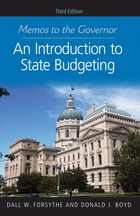
This revised and updated edition of Memos to the Governor is a concise and highly readable guidebook that explains in clear, understandable prose the technical, economic, and political dynamics of budget making. Updated with many new examples of budget quandaries from recent years, this book helps current and future public administrators untangle the knotty processes of budget preparation and implementation.
Authors Dall W. Forsythe and Donald J. Boyd outline the budgeting process through a series of memos from a budget director to a newly elected governor—a format that helps readers with little or no background understand complicated financial issues. They cover all of the steps of budget preparation, from strategy to execution, explaining technical vocabulary, and discussing key topics including baseline budgeting, revenue forecasting, and gap-closing options.
Forsythe and Boyd bring fresh insights into such issues as the importance of a multiyear strategic budget plan, the impact of the business cycle on state budgets, the tactical problems of getting budgets adopted by legislatures, and, of course, the relationship between governor and budget officer. Memos to the Governor is a painless, practical introduction to budget preparation for students of and practitioners in public administration and public-sector financial management.

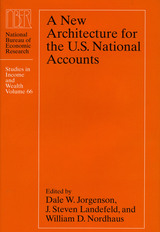
Since the United States economy accounts for almost thirty percent of the world economy, it is not surprising that accounting for this huge and diverse set of economic activities requires a decentralized statistical system. This volume outlines the major assignments among institutions that include the Bureau of Economic Analysis, the Bureau of Labor Statistics, the Department of Labor, the Census Bureau, and the Governors of the Federal Reserve System.
An important part of the motivation for the new architecture is to integrate the different components and make them consistent. This volume is the first step toward achieving that goal.
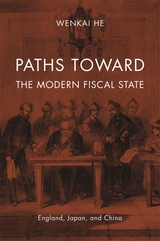
The rise of modern public finance revolutionized political economy. As governments learned to invest tax revenue in the long-term financial resources of the market, they vastly increased their administrative power and gained the ability to use fiscal, monetary, and financial policy to manage their economies. But why did the modern fiscal state emerge in some places and not in others? In approaching this question, Wenkai He compares the paths of three different nations—England, Japan, and China—to discover why some governments developed the tools and institutions of modern public finance, while others, facing similar circumstances, failed to do so.
Focusing on three key periods of institutional development—the decades after the English Civil Wars, the Meiji Restoration, and the Taiping Rebellion—He demonstrates how each event precipitated a collapse of the existing institutions of public finance. Facing urgent calls for revenue, each government searched for new ways to make up the shortfall. These experiments took varied forms, from new methods of taxation to new credit arrangements. Yet, while England and Japan learned from their successes and failures how to deploy the tools of modern public finance and equipped themselves to become world powers, China did not. He’s comparative historical analysis isolates the nature of the credit crisis confronting each state as the crucial factor in determining its specific trajectory. This perceptive and persuasive explanation for China’s failure at a critical moment in its history illuminates one of the most important but least understood transformations of the modern world.
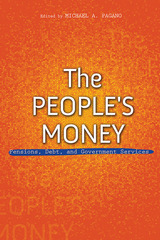
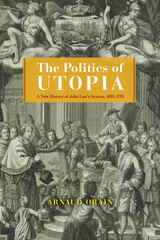
The Scottish economist John Law has been described as the architect of modern central banking. His “System,” established in Regency France between 1716 and 1720, saw the founding of a bank issuing paper money and the establishment of state commercial and colonial enterprises aimed at consolidating public debt. What at first seemed like financial wizardry, however, resulted in rampant speculation and, ultimately, economic collapse. In The Politics of Utopia, historian Arnaud Orain offers a provocative rereading of this well-known episode.
Starting his story in the seventeenth century, Orain reconstructs the figures and ideas, long predating Law, that anticipated and laid the groundwork for the System, which, he argues, is best understood as a failed social utopia aimed at the total transformation of society. Overturning familiar narratives of this seismic event, this book rewrites a stunning chapter in economic history by dealing with the cultural, colonial, religious, and political dimensions of the (in)famous System up to the French Revolution, revealing new lessons for today’s fraught financial landscape.

The authors provide an eye-opening account of recent battles over publicly financed stadiums in some of America’s largest cities. Their interviews with the key decision makers present a behind-the-scenes look at how and why powerful individuals and organizations foist these sports palaces on increasingly unreceptive communities.
Delaney and Eckstein show that in the face of studies demonstrating that new sports facilities don’t live up to their promise of big money, proponents are using a new tactic to win public subsidies¾intangible “social” rewards, such as prestige and community cohesion. The authors find these to be empty promises as well, demonstrating that new stadiums may exacerbate, rather than erase, social problems in cities.

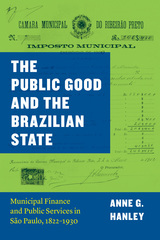
In The Public Good and the Brazilian State, Anne G. Hanley assembles an economic history of public revenues as they developed in nineteenth-century Brazil. Specifically, Hanley investigates the financial life of the municipality—a district comparable to the county in the United States—to understand how the local state organized and prioritized the provision of public services, what revenues paid for those services, and what happened when the revenues collected failed to satisfy local needs. Through detailed analyses of municipal ordinances, mayoral reports, citizen complaints, and financial documents, Hanley sheds light on the evolution of public finance and its effect on the early economic development of Brazilian society. This deeply researched book offers valuable insights for anyone seeking to better understand how municipal finance informs histories of inequality and underdevelopment.
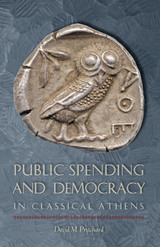
In his On the Glory of Athens, Plutarch complained that the Athenian people spent more on the production of dramatic festivals and “the misfortunes of Medeas and Electras than they did on maintaining their empire and fighting for their liberty against the Persians.” This view of the Athenians’ misplaced priorities became orthodoxy with the publication of August Böckh’s 1817 book Die Staatshaushaltung der Athener [The Public Economy of Athens], which criticized the classical Athenian dēmos for spending more on festivals than on wars and for levying unjust taxes to pay for their bloated government. But were the Athenians’ priorities really as misplaced as ancient and modern historians believed?
Drawing on lines of evidence not available in Böckh’s time, Public Spending and Democracy in Classical Athens calculates the real costs of religion, politics, and war to settle the long-standing debate about what the ancient Athenians valued most highly. David M. Pritchard explains that, in Athenian democracy, voters had full control over public spending. When they voted for a bill, they always knew its cost and how much they normally spent on such bills. Therefore, the sums they chose to spend on festivals, politics, and the armed forces reflected the order of the priorities that they had set for their state. By calculating these sums, Pritchard convincingly demonstrates that it was not religion or politics but war that was the overriding priority of the Athenian people.

Each contributor provides a retrospective on Shoup’s various contributions to the field, reviewing the literature and assessing its relevance to current problems in public finance theory and policy. The essays highlight and analyze fiscal theory and public policy developments from the 1930s to the present in four areas: the Shoup tax missions to Japan, Venezuela, and Liberia; the tax mix; the expenditure mix; and macro public finance.
Contributors. Lorraine Eden, Carl S. Shoup, Malcolm Gillis, Minoru Nakazato, Charles E. McLure Jr., John Bossons, Richard Goode, William Vickery, Wayne Thirsk, John Graham, Stanley Winer, W. Irwin Gillespie, Melville L. McMillan, Cliff Walsh, John G. Head, Enid Slack, Edwin G. West, Richard M. Bird, Peggy B. Musgrave, Douglas A. L. Auld, John B. Burbidge, Jack M. Mintz, John Sargent, Richard A. Musgrave
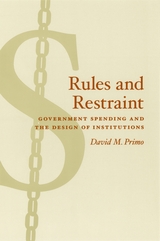
One reason budget rules are ineffective, David Primo shows, is that politicians often create and preserve loopholes to protect programs that benefit their constituents. Another reason is that legislators must enforce their own provisions, an arrangement that is seriously compromised by their unwillingness to abide by rules that demand short-term sacrifices for the sake of long-term gain. Convinced that budget rules enacted through such a flawed legislative process are unlikely to work, Primo ultimately calls for a careful debate over the advantages and drawbacks of a constitutional convention initiated by the states—a radical step that would bypass Congress to create a path toward change. Rules and Restraint will be required reading for anyone interested in institutional design, legislatures, and policymaking.
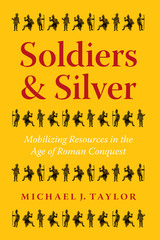
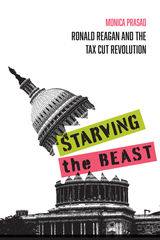
Drawing on never-before seen archival documents, Prasad traces the history of the 1981 tax cut—the famous “supply side” tax cut, which became the cornerstone for the next several decades of Republican domestic economic policy. She demonstrates that the main impetus behind this tax cut was not business group pressure, racial animus, or a belief that tax cuts would pay for themselves.
Rather, the tax cut emerged because in America--unlike in the rest of the advanced industrial world—progressive policies are not embedded within a larger political economy that is favorable to business. Since the end of World War II, many European nations have combined strong social protections with policies to stimulate economic growth such as lower taxes on capital and less regulation on businesses than in the United State. Meanwhile, the United States emerged from World War II with high taxes on capital and some of the strongest regulations on business in the advanced industrial world. This adversarial political economy could not survive the economic crisis of the 1970s.
Starving the Beast suggests that taking inspiration from the European model of progressive policies embedded in market-promoting political economy could serve to build an American economy that works better for all.
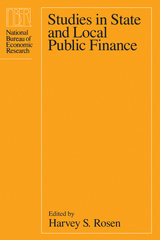
Developed from a National Bureau of Economic Research conference on state and local financing, the volume includes papers summarizing and extending recent research as well as commentaries. Covering a wide range of topics, the papers share an empirical orientation and a concern with policy issues. The first two papers look at the role of tax-exempt bonds in local public finance. Their findings suggest that tax policies significantly affect municipal borrowing practices and that financial advantage can be achieved under certain of these practices. Other papers address specific issues related to state and local tax policy: the impact of local taxes on location decisions; efficient road-use charges for trucks; and the relation of income and general sales tax systems over time. Examining issues related to United States federalism, the last paper focuses on the impact of federal grant aid to states.
The research and findings these papers report make an important contribution to the study of local public finance and should be of particular interest to policymakers and those involved in private and public financing at the local, state, or federal level.

That economics can usefully explain politics is no longer a novel idea, it is a well-established fact brought about by the work of many public choice scholars. This book, which is a sequel to a similar volume published in 1972, brings together a fresh collection of recent work in the public choice tradition. The essays demonstrate the power of the public choice approach in the analysis of government. Among the issues considered are income redistribution, fiscal limitations on government, voting rules and processes, the demand for public goods, the political business cycle, international negotiations, interest groups, and legislators.
James M. Buchanan is University Distinguished Professor and direct, Center for Study of Public Choice at George Mason University.
Robert D. Tollison, formerly director, Bureau of Economics, Federal Trade Commission, is now Abney Professor of Economics at Clemson University.
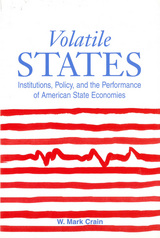
READERS
Browse our collection.
PUBLISHERS
See BiblioVault's publisher services.
STUDENT SERVICES
Files for college accessibility offices.
UChicago Accessibility Resources
home | accessibility | search | about | contact us
BiblioVault ® 2001 - 2024
The University of Chicago Press









